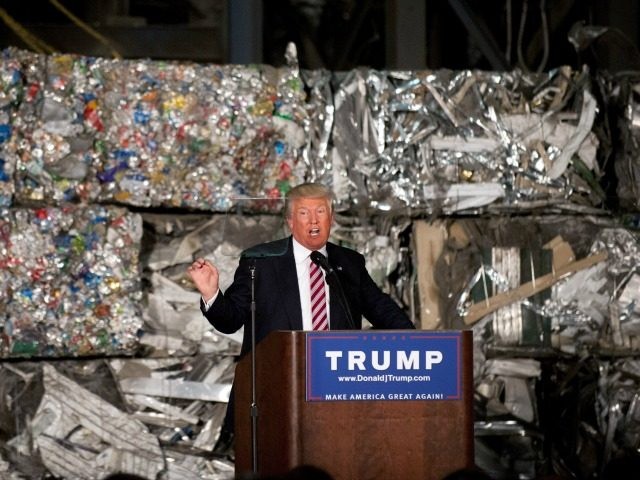If you drive through the upper Midwest and Northeast, it’s hard not to wonder whether so-called free trade agreements are good for America or American workers.
I am a Republican, an international trade attorney, and a believer in free trade. However, recent global trade agreements are hollowing out America’s manufacturing sector and turning America’s once mighty industrial heartland into a ghost town.
Last week, Donald Trump detailed his trade positions at a rally in Monessen, Pennsylvania. He called for withdrawing from the Trans-Pacific Partnership (TPP), renegotiating or withdrawing from the North American Free Trade Agreement (NAFTA), and cracking down on China’s currency manipulation and trade violations.
While Trump’s vision departs from the GOP establishment and donor class, his trade agenda is good for American workers, consistent with free market and conservative values, and in line with both Republican voters and Republican tradition.
Free trade can benefit a country if done right. However, I know from firsthand experience that there is nothing free market about these trade deals. There are dozens of government agencies and thousands of bureaucrats who regulate trade policy. Much of my law practice involves navigating cumbersome regulations which originated from international trade agreements.
The late free market economist Milton Friedman said NAFTA was “not a Free Trade Agreement, it’s a Managed Trade Agreement.” Indeed, NAFTA was 300 pages long and lead to thousands of pages of regulations. TPP is over 2,000 pages—almost as many as Obamacare. To make matters worse, these deals give international institutions like the World Trade Organization, which has literally thousands of regulations, jurisdiction to handle many disputes with American companies.
Trump is not proposing a trade war or cutting America off from foreign markets. Instead, he advocates ensuring that our trading partners adhere to their past promises and that future trade deals benefit American workers.
Most importantly, Trump will level the playing field with China. Writing in the Wall Street Journal, Don Luskin notes that even “the staunchest advocates of trade” should “insist that China open its markets to us symmetrically, and protect U.S. intellectual property.” National Counterintelligence Executive William Evanina estimates that China steals near $400 billion dollars a year in trade secrets and intellectual property from hacking alone.
China also devalues its currency by 15 to 40 percent, which effectively subsidizes its exports, while raising the price on imports. Economist C. Fred Bergsten of the President’s Advisory Committee for Trade Policy and Negotiations argues that this “currency manipulation is, by far, the world’s most protectionist international economic policy in the 21st century.”
Unfortunately, President Obama is not taking his advice as he notes that “neither the U.S. government nor the responsible international institutions, the International Monetary Fund and the World Trade Organization, have mounted effective responses.”
Luskin points to studies by MIT’s David Autor and others which show that trade with China has not produced the expected benefits for America. Indeed, in the decade before China joined the WTO in 2001 the U.S. averaged 2.3 percent per capita growth, but this went down almost three fold to 0.8 percent in the decade after.
Simon Rosenberg of the New Democratic Network tweeted, “Trump’s rants against trade . . . show how far modern GOP has drifted from Reagan.”
While it’s gratifying to see a Democratic strategist suddenly concerned about preserving Reagan Republicanism, the Gipper instituted heavy tariffs to protect American industry. During his presidency, the Cato Institute accused Reagan of being the “most protectionist president since Herbert Hoover, the heavyweight champion of protectionists.”
Reagan and Hoover were not the first Republican presidents to institute protective tariffs. Abraham Lincoln said that abandoning a “protective policy” would produce “want and ruin among our people.” Teddy Roosevelt wrote that “pernicious indulgence in the doctrine of free trade seems inevitably to produce fatty degeneration of the moral fiber,” and ran on the platform that “[p]rotection, which guards and develops our industries, is a cardinal policy of the Republican Party.” Conservative Republican leaders from Calvin Coolidge to Robert Taft continued this tradition.
Neither Trump nor I advocate re-erecting the 19th and early 20th-century tariff walls. However, this history belies those, like think tank president Tom Giovanetti, who claim “Trump would turn the Republican Party into the party of economic know-nothings”—unless they would use that slur on Reagan or Lincoln.
GOP consultant Tony Fratto said that Trump’s speech “flies in the face of what Republicans believe about markets and the economy and free trade.” This may be true for the GOP consultants and Wall Street donors, but Republican voters side with Trump. A Huffington Post/YouGov poll released Monday found that only 28% of Republicans and 36% of all voters believe that “free trade agreements between the US and other countries have been a good thing” for America.”
These voters have to live with the consequences of the failed trade policies Washington elites promote. Donald Trump is the only candidate who will give them a voice in November.
Corey Stewart is the Virginia Chairman for Donald Trump’s Presidential Campaign and also the Chairman of the Board of County Supervisors in Prince William County, Virginia.

COMMENTS
Please let us know if you're having issues with commenting.